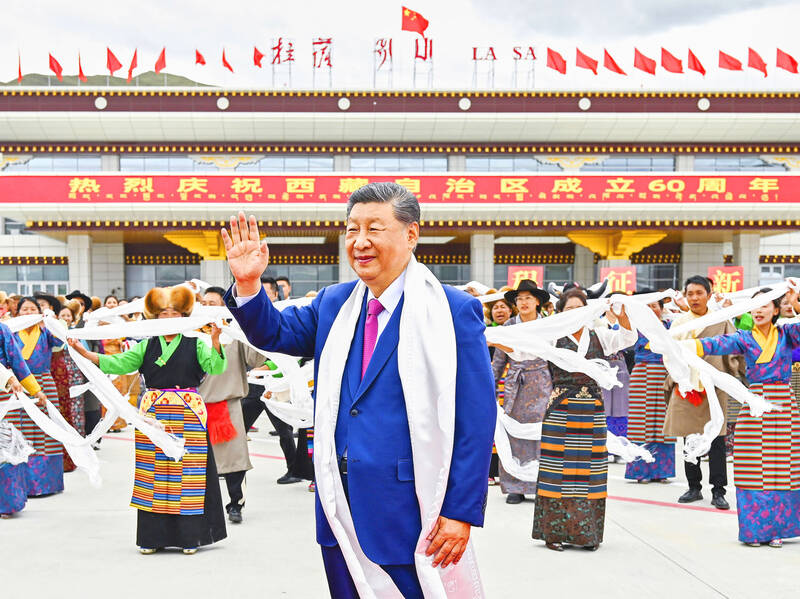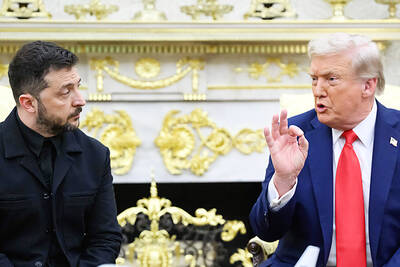Chinese President Xi Jinping (習近平) attended a grand ceremony in Lhasa yesterday during a rare visit to Tibet, where he urged “ethnic unity and religious harmony” in a region where China is accused of human rights abuses.
The vast high-altitude area on the country’s western edge, established as an autonomous region in 1965 — six years after the 14th Dalai Lama fled into exile — was once a hotbed for protest against Chinese Communist Party rule.
Rights groups accuse Beijing’s leaders of suppressing Tibetan culture and imposing massive surveillance, although authorities claim their policies have fostered stability and rapid economic development in one of China’s poorest regions.

Photo: Xinhua via AP
“To govern, stabilize and develop Tibet, we must first safeguard political stability, social stability, ethnic unity and religious harmony,” state broadcaster CCTV reported Xi as saying on Wednesday.
Party officials yesterday lauded the region’s progress and urged ethnic unity during an event to mark the 60th anniversary of the founding of the autonomous region.
The ceremony was held in front of the Potala Palace, the ancient residence of Dalai Lamas.
Chinese People’s Political Consultative Conference Chairman Wang Huning (王滬寧) called for “deepening the anti-secession struggle, and ensuring the consolidation and security of the border areas.”
“Any attempt to split the motherland and undermine Tibet’s stability is doomed to failure,” he said.
A giant portrait of Xi flanked a crowd numbering 20,000, which included military personnel, schoolchildren and other members of Tibetan society, CCTV reported.
A parade followed, showcasing Tibetan dancers, floats emblazoned with official slogans and formations of troops.
Xi’s visit comes ahead of potential tensions over the succession of the 90-year-old Dalai Lama, who lives in India, where he established a Tibetan government-in-exile.
The Dalai Lama last month said the spiritual institution would continue after his death, with a successor decided “exclusively” by his office.
China’s rulers insist the next Dalai Lama must be approved by the government in Beijing, raising the prospect of two rival leaders of Tibetan Buddhism emerging.
Xi on Wednesday also called for “guiding Tibetan Buddhism to adapt to socialist society in accordance with the systematic Sinicization of religion.”
He made no mention of the Dalai Lama.

Shamans in Peru on Monday gathered for an annual New Year’s ritual where they made predictions for the year to come, including illness for US President Donald Trump and the downfall of Venezuelan President Nicolas Maduro. “The United States should prepare itself because Donald Trump will fall seriously ill,” Juan de Dios Garcia proclaimed as he gathered with other shamans on a beach in southern Lima, dressed in traditional Andean ponchos and headdresses, and sprinkling flowers on the sand. The shamans carried large posters of world leaders, over which they crossed swords and burned incense, some of which they stomped on. In this

Near the entrance to the Panama Canal, a monument to China’s contributions to the interoceanic waterway was torn down on Saturday night by order of local authorities. The move comes as US President Donald Trump has made threats in the past few months to retake control of the canal, claiming Beijing has too much influence in its operations. In a surprising move that has been criticized by leaders in Panama and China, the mayor’s office of the locality of Arraijan ordered the demolition of the monument built in 2004 to symbolize friendship between the countries. The mayor’s office said in

‘TRUMP’S LONG GAME’: Minnesota Governor Tim Walz said that while fraud was a serious issue, the US president was politicizing it to defund programs for Minnesotans US President Donald Trump’s administration on Tuesday said it was auditing immigration cases involving US citizens of Somalian origin to detect fraud that could lead to denaturalization, or revocation of citizenship, while also announcing a freeze of childcare funds to Minnesota and demanding an audit of some daycare centers. “Under US law, if an individual procures citizenship on a fraudulent basis, that is grounds for denaturalization,” US Department of Homeland Security Assistant Secretary Tricia McLaughlin said in a statement. Denaturalization cases are rare and can take years. About 11 cases were pursued per year between 1990 and 2017, the Immigrant Legal Resource

‘RADICALLY DIFFERENT’: The Kremlin said no accord would be reached if the new deal with Kyiv’s input did not remain within the limits fixed by the US and Russia in August Ukrainian President Volodymyr Zelenskiy is to meet US President Donald Trump in Florida this weekend, but Russia on Friday accused him and his EU backers of seeking to “torpedo” a US-brokered plan to stop the fighting. Today’s meeting to discuss new peace proposals comes amidst Trump’s intensified efforts to broker an agreement on Europe’s worst conflict since World War II. The latest plan is a 20-point proposal that would freeze the war on its current front line, but open the door for Ukraine to pull back troops from the east, where demilitarized buffer zones could be created, according to details revealed by